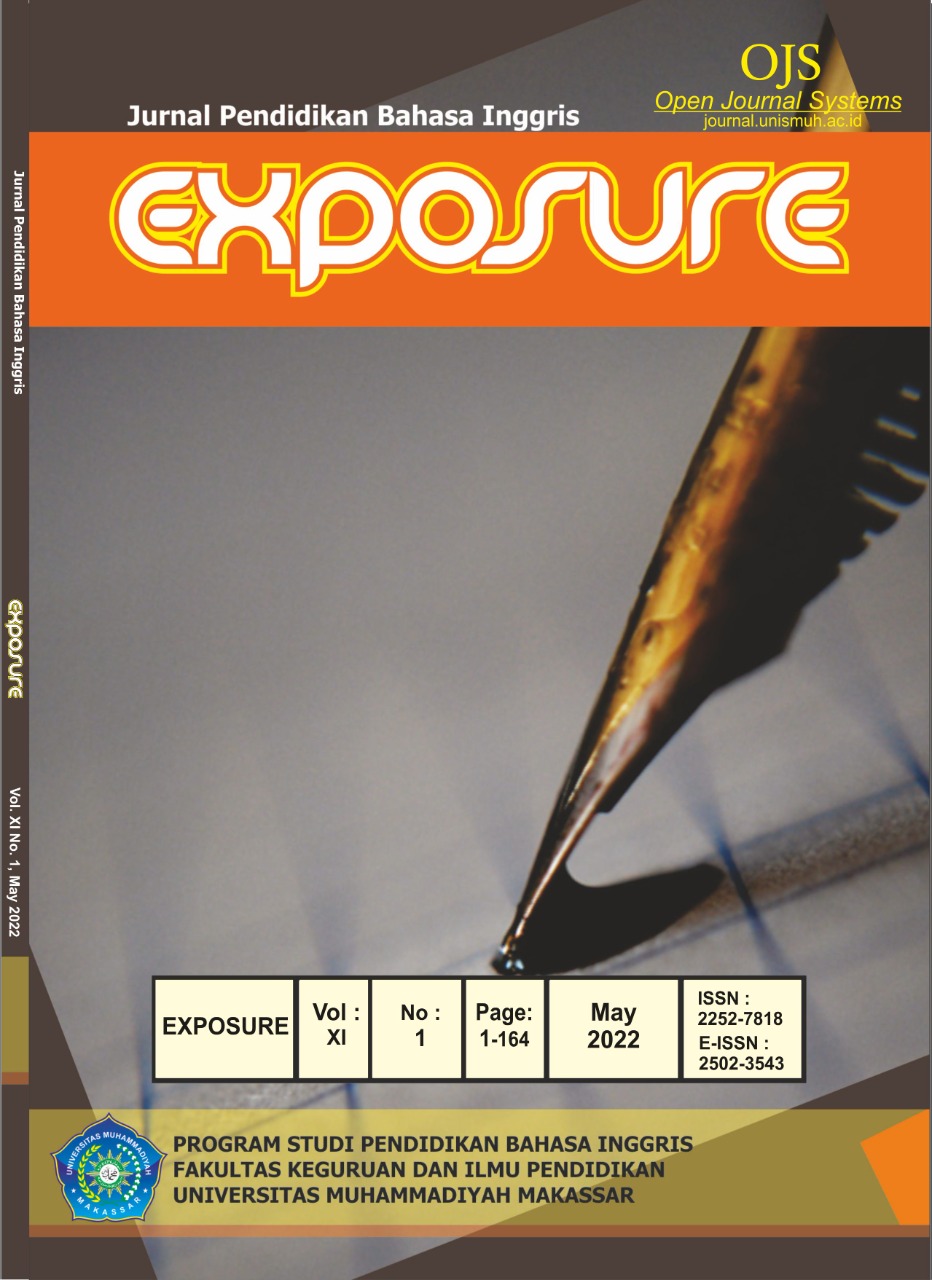ANALYSIS OF THE TERTIARY STUDENTS’ ENGLISH WRITING ERRORS; WHAT ERRORS ARE AND WHAT LEVELS ARE
DOI:
https://doi.org/10.26618/exposure.v11i1.7156Keywords:
English Error Analysis, Types or Errors, English Grammar LevelsAbstract
Writing, the language skill three, is a part of the productive skill of the four intergrated language skills. Error Analysis as the language learning approach to study about the problematic English written product. It is the mostly-complecated skill than the others. This current study aims at analyzing the grammatical errors made of and investigating the levels of English grammatical errors produced. This study was carried out by using a descriptive quantitative research method by using a test, a guided writing test by letting the students write the patterned texts by answering the questions given, as the instrument to obtain the data on the error types made and the levels of English grammatical errors produced. This study shows that the non-syntactical errors found are spellings (44%), punctuations (19%), Capitalizations & LCL (14%), and the selection of words (23%). Whereas the syntactical errors are the use of articles (5.5%), parts of speech (8%), subject-verbs agreement (11%), using regular and Irregular verbs (8%), making phrases (9%), subjunctives (4.5%), reported speech (6%), compound sentences (15), complex sentences (16%), modal usages (7%), and using tenses (10%). There are three levels of English grammatical errors produced; basic grammar errors (43%), intermediate grammar errors (16%), and the intermediate grammar errors (41%).
References
Abderraouf, Annab. (2016). Investigating EFL Students’ Eriting Difficulties and Common errors in Writing (Master Thesis). The University of Bajaia. (Published).
Heydari, Pooneh & Bagheri, Mohammad, S. (2012). Error Analysis; Sources of L2 Learners’ Errors. Theory and Practice in Language Studies. Vol. 2, No. 8, 1584-1589.
Hourani, Taiseer, M.Y. (2008). An Anlysis of the Common Grammatical Errors in the English Essay Writing Made by 3th Secondary Male Students in the Eastern Coast of the UAE (Dissertation). The Institute of Education of the British University in Dubai. (Published)
Islamiyah, Muflihah. (2012). Error Analysis on English Sound Produced by English Learners; The Influence of Transfer. Leksika. Vol. 6. No. 1, 1-9.
Richard, J. C. (1971). A Non Contrastive Approach to Error Analysi. English Language teaching Journal. No. 25, 204-219.
Sari, Prnama, E.M. (2016). Interlingual Errors and Intralingual Errors Found in Narrative Text Written by EFL Students in Lampung. Jurnal Penelitian Humaniora.Vol.17. No. 2, 87-95.
Sermsook, Kanyakorn, et.al. (2017). An Analysis of Errors in Written English Sentences: A Case Study of Thai EFL Students. English Language Teaching. Vol. 10. No. 3, 101-110.
Downloads
Published
Issue
Section
License
Authors who publish with this journal agree to the following terms:
In order to assure the highest standards for published articles, a peer review policy is applied. In pursue of the compliance with academic standards, all parties involved in the publishing process (the authors, the editors and the editorial board and the reviewers) agree to meet the responsibilities stated below in accordance to the Journal publication ethics and malpractice statement.
Duties of Authors:
- The author(s) warrant that the submitted article is an original work, which has not been previously published, and that they have obtained an agreement from any co-author(s) prior to the manuscript’s submission;
- The author(s) should not submit articles describing essentially the same research to more than one journal;
- The authors(s) make certain that the manuscript meets the terms of the Manuscript Submission Guideline regarding appropriate academic citation and that no copyright infringement occurs;
- The authors(s) should inform the editors about any conflict of interests and report any errors they subsequently, discover in their manuscript.
Duties of Editors and the Editorial Board:
- The editors, together with the editorial board, are responsible for deciding upon the publication or rejection of the submitted manuscripts based only on their originality, significance, and relevance to the domains of the journal;
- The editors evaluate the manuscripts compliance with academic criteria, the domains of the journal and the guidelines;
- The editors must at all times respect the confidentiality of any information pertaining to the submitted manuscripts;
- The editors assign the review of each manuscript to two reviewers chosen according to their domains of expertise. The editors must take into account any conflict of interest reported by the authors and the reviewers.
- The editors must ensure that the comments and recommendations of the reviewers are sent to the author(s) in due time and that the manuscripts are returned to the editors, who take the final decision to publish them or not.
Authors are permitted and encouraged to post online a pre-publication manuscript (but not the Publisher’s final formatted PDF version of the Work) in institutional repositories or on their Websites prior to and during the submission process, as it can lead to productive exchanges, as well as earlier and greater citation of published work (see The Effect of Open Access). Any such posting made before acceptance and publication of the Work shall be updated upon publication to include a reference to the Publisher-assigned DOI (Digital Object Identifier) and a link to the online abstract for the final published Work in the Journal.

